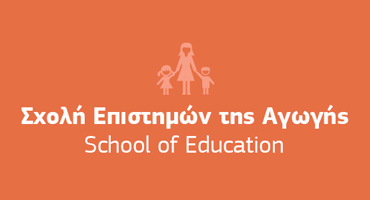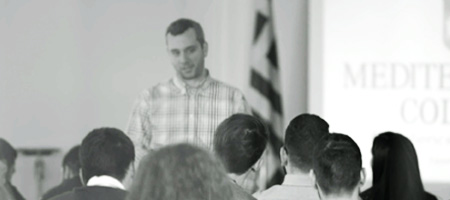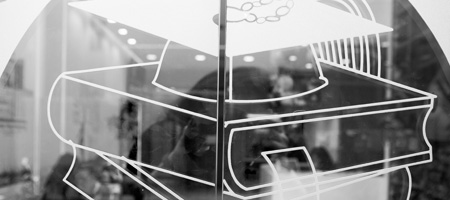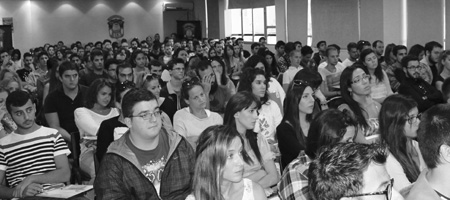





BA (Hons) Early Childhood Studies
-
No1 in Greece | TOP20 in the UK.
-
Practical applications, workshops & simulations.
-
Supervised placement.
-
Worldwide professional recognition.

Course Information
The BA (Hons) Early Childhood Studies has been designed by the University of Derby, a TOP20 UK University in Education Studies, according to the Guardian University Guide 2019.
You will gain a thorough understanding of early childhood from birth to eight years, exploring how children develop, learn and think, building the professional skills and knowledge to meet their needs. You’ll look at the importance of early childhood from a broad range of perspectives.
During the course, you will focus on identifying and meeting children’s holistic needs, so you will consider all the challenges and opportunities faced by early years professionals working in a variety of children’s services.
The role of professional and personal development is an important theme for this course. By spending a substantial amount of time on placement, you’ll draw on your own practical experiences with young children to advance your knowledge.
What you will study
Our teaching approach is a combination of theory and practice. Workshop sessions in crafts, music, drama play, and kinetics are delivered in our first-rate facilities and equip you with practical skills to create your own learning material.
Real-world learning lies at the heart of this course. You’ll undertake a placement for one or two days each week, building your skills in working with children and boosting your employability. We liaise closely with nurseries, children’s centres and other early years employers, so you’ll gain practical knowledge of what it is like to work in different settings as well as developing your observational and reflective skills.
You will participate in personal and professional development activities, such as fieldtrips, guest lectures, seminars and voluntary work. You will be encouraged to develop your research skills and present your work in conferences, organised by Mediterranean College, the University of Derby or other national or international organisations.
Why choose this course
- The degree is awarded by the No1 Ranked UK University in Greece and TOP20 in the UK.
- It leads to professional recognition as an Early Childhood Educator or Nursery Teacher.
- It incorporates practical workshop sessions in Crafts, Music, Kinetics and Drama Play.
- Supervised placement is an integral part of the curriculum.
- You gain invaluable experience through our multiple activities: fieldtrips, guest lectures, seminars, voluntary work, participation in conferences, etc.
- You become a bilingual professional,with exceptional academic and career prospects.
- It is a research-oriented programme, giving you the opportunity to present your work in scientific conferences.
Teaching and learning takes place in creative ways: lectures, guest lectures, seminars, workshops, tutorials, role-plays, presentations, conferences. Assessment does not rely on exams, but rather on coursework, oral & poster presentations, short tests and quizzes and research activity.
The programme includes a compulsory 200-hours work placement with structured supervision. Students can undertake their placement at a combination of settings, such as preschool education centres, nursery schools, after-school activity centres, children museums, NGOs. The School collaborates with a wide network of preschool educational settings. Placement advances students’ professional knowledge and eventually provides access to the labour market.
Courses
Level 4 / Year 1
Preparing to Study
This module is intended to develop the skills and confidence required for students to engage holistically with their own personal, professional and academic growth during their time as an undergraduate student. The module will support students to critically consider the nature of learning and explore ways of demonstrating it through their academic behaviour, including communicating and justifying their ideas, listening to others, reflecting on different perspectives, making critical evaluations of theory and accessing a range of academically appropriate sources of information. Students will be introduced to the expectations associated with a range of academic assessments with a focus on supporting students to write for different purposes and in different formats, including a variety of digital technologies. Additionally, the module facilitates self-evaluation of a range of key skills. Inherent in this is the development of the skill of critical and insightful reflection, encouraging students to develop as autonomous learners who are independent, resilient and responsible.
Contextualising Childhood: Theory, Philosophy and Pioneers
This module provides an exploration into childhood theory through a transdisciplinary perspective. The integration of key theories and methodologies from multiple disciplines with a specific focus on the application of integrated thinking to complex issues related to childhood. Through this module, a nuanced understanding of childhood theory is promoted, along with the development of the ability to work effectively across disciplinary boundaries.
Principles for Sustainability through Play and Creativity
This module considers the role of play and creativity within children’s learning and development in early childhood. The module will examine a range of theories in relation to how play supports children’s holistic development, as well as how opportunities for play and creativity can be provided within early childhood. The module will also consider the relationship between the current curriculum guidance and opportunities for play and creativity. Sustainability and inclusive practice will be embedded through this module.
Professional Identities in Early Childhood
This module will consider the importance of a professional identity when working in the Early Childhood sector. During the module, students will examine global policy, legislation and provision with a consideration of the historical, political, economic and cultural contexts to this. Together with this, this module will introduce students to the practical element of observation a key role in assessing children within their unique contexts. The significance of safeguarding in its widest context will be embedded through this module.
Understanding Holistic Development
This module considers some of the major theoretical components in the holistic (social, emotional, physical, cognitive and language) development of children. Consideration will be given to local, national, and global factors that may influence healthy holistic development. This module will also provide an understanding of how socio-political policy affects children.
Supporting Holistic Development
This module builds upon student’s understanding of the major theoretical components in the holistic (social, emotional, physical, cognitive and language) development of children. Consideration will be given to local, national, and global factors that may influence healthy holistic development. It further explores the role of both human and environmental influences and provides critical appraisal of the role of significant adults. A critical understanding of equal rights and dignity will be embedded throughout this module.
English I
Students will develop their general English skills in reading, writing, listening and speaking, and be provided with an introduction to academic English. Students will develop their grammatical, phonological and general and subject specific lexical awareness. By the end of the module students’ language for academic study should be at a mid B2 on the CEFR equivalent to IELTS 5.5.
Creative Educational Lab (Music, Art, Theater, Handcrafts, Storytelling) Ι
The main aim of the programme is to combine high academic knowledge with practical skills in order to prepare students for their professional career in the field. Based on the above aim, the ‘Educational Activities’ module was developed to help students develop certain knowledge and skills and to train them in order to be able to design and implement creative art education activities. Students attend workshops in music, creative movement, art, crafts and drama. All activities take place at a designated Educational Lab, where students have the opportunity to be trained and also to design and use their own educational material.
Level 5 / Year 2
Creative Communication and Listening in Early Childhood
This module builds on from stage 1 module Innovative Play and Creativity and considers the role of creativity in children’s learning and communicative capacity. The module will provide a deeper understanding of how current issues in children’s lives can be explored through creative methods and how children can express their knowledge in multiple creative ways, including visual, embodied and auditory. Contemporary aspects of childhood experience will be addressed including sustainability, technology, children’s literacies, identity, inclusion and multimodality. The module will explore how creativity can support children to become autonomous decision makers and competent in expressing their voices in multiple ways. It will also enable students to fully appreciate children’s multiple communicative capacities.
Family Diversity, Community and Culture
The module considers differing roles and relationships within the family and investigates the extent to which factors such as siblings, parents, and the extended family impact children’s development. It considers perspectives drawn from Sociological and Psychological theory and research and invites students to reflect on their own experiences and observations.
Professional Identities for Equitable Practice
This module will explore the role of the Early Childhood Studies graduate as an advocate for children and families. In doing so students will be introduced to themes of equality, diversity, inclusion, social justice and anti-racism. Students will be supported in their understanding of historical, systemic and societal inequalities which impact children and their families and identify the role of the Early Childhood Studies graduate in challenging such inequalities. Students will critically explore professional accountability and the tensions which may exist for professionals working within children’s diverse ecologies. This module will critically consider the role of reflection in personal, professional and academic growth. Students will be supported to critically explore their own position within reflective practice as well as identifying ways in which reflection can be embedded as a form of continuous development. Students will engage in self-reflection and personal development planning to demonstrate a commitment to their own personal, professional and academic development. All students on this module will engage in placement/work experience. As such, an emphasis on employability and employability skills will be central.
Promoting Children’s Health and Wellbeing
This module is intended to develop students’ knowledge of concepts of health and wellbeing as they apply to children in contemporary society, and how this is related to healthy growth and development. Throughout the module a strong emphasis is placed on gathering evaluating and communicating accurate health information and advice to varied populations on specific topics. The role of adults and early years practitioners in promoting children’s health and wellbeing will be a key feature of this module, as will be consideration of enabling environments and the role these can play.
Research in Early Childhood Ethics, Agency and Participation
This module introduces students to research in Early Childhood and considers how it has evolved based on changing paradigms of children’s capacity, agency and rights. Students will learn the key skills and knowledge required to support the ethical planning of a conversation with a child and how they can apply different methods of data collection, analysis and interpretation.
Safeguarding Children Advocacy, Policy and Practice
This module will equip students with the knowledge and understanding of the wider legislative and statutory duties for safeguarding children and their families. The module will help students to understand the breadth of children’s lives, from a range of cultural and societal perspectives. This module will promote an understanding of the different ways that agencies work including multi agency and multi-disciplinary working. Finally, this module will support students to advocate for children and their rights within anti-discriminatory and anti-oppressive practice.
English II
The module builds on English I and further develops students’ general and academic English skills in reading, writing, listening and speaking. Students will be exposed to more advanced forms of academic English. Students will further develop their grammatical, phonological and general and subject specific lexical awareness. By the end of the module students’ language for academic study should be at a B2/B2+ on the CEFR equivalent to IELTS 6.0 or above.
Creative Educational Lab (Music, Art, Theater, Handcrafts, Storytelling) ΙΙ
The main aim of the programme is to combine high academic knowledge with practical skills in order to prepare students for their professional career in the field. Based on the above aim, the ‘Educational Activities’ module was developed to help students develop certain knowledge and skills and to train them in order to be able to design and implement creative art education activities. Students attend workshops in music, creative movement, art, crafts and drama. All activities take place at a designated Educational Lab, where students have the opportunity to be trained and also to design and use their own educational material.
Level 6 / Year 3
Challenging Childhood: Rights, Discourses and Debates
This module aims to equip students with a critical understanding of childhood; recognising it is a contested phenomenon. It explores competing ideas of childhood from psychology, sociology, health, welfare, educational, cultural, philosophical, legal, historical, political, and economic perspectives. These perspectives will be explored from a current local, national, and global level.
Creative Pedagogies
Creativity, therapeutic and sustainability has achieved in recent years, renewed status, supported by compelling claims for deep learning, deep thinking and engagement with others. Recent interest has extended the notion of creativity, therapeutic and sustainability to encompass children’s geographies, engagement with nature and awareness of surroundings. This module aims to equip students with a critical understanding and awareness of both importance of and potential for children’s creative development in the wider context of play spaces, community, and home. There is an opportunity to discuss economic, social, and political influences on freedom, risk and play opportunities.
Professional Identities for Critical Practice and Leadership
Drawing on your professional and academic journey during the Early Childhood Studies Degree. This module enables students to recall, explain, analyse and reflect upon their own professional practice and personal development through the nurturing of critical thinking and reflection skills. It provides an opportunity for students to bring synthesis to their academic and practice-based journey and their personal progression which will support them in their future professional practice (knowledge and skills). In considering the student’s developing professional agenda the module will incorporate some of the key issues for practitioners and leaders in early years’ settings and the challenges they face. This will include consideration of the skills and abilities required to promote and sustain innovative practice and social responsibility (values and attitudes).
Special Educational Needs and Disabilities in an Early Childhood
In this module, students will critically analyse current values and attitudes in surrounding special educational needs and disability critically reflecting on current practice. This module will explore the complex nature of special educational needs and disability and examine the importance of investigating the individual needs and strategies used across multi agency teams. Throughout the module, there will be an emphasis on creative approaches to the promotion of an inclusive environment.
Independent Research Project
This module enables students to apply their skills, knowledge and understanding of childhood developed so far on the degree, in an independent research project on a self-defined field of study. The module will support students through the design, ethics, planning and writing up of their study, though key lectures at distinct points in their research journey. The module provides students with an opportunity to study an area of interest in considerable depth, supported by an allocated supervisor, that relates to their future career, current practice, or may be developed further through postgraduate study or further research.
Admission Requirement
This course is right for you, if you are a high school graduate of any discipline, who aspires to work with children, either as an educator, or in social and childhood welfare services.
The minimum English language requirement for the Greek-taught course is equivalent to IELTS 4.5 (B1) and for the English-taught course equivalent to 6.0 (B2). If you do not possess an official English language certificate, you can sit the College’s internal placement test.
Moreover, you’ll be asked to submit a reference letter from a tutor, and you’ll be called for an academic interview with the programme leader.
If you are a holder of an IEK/ HND diploma or a University or College student in a relevant discipline, you may be granted advanced entry, through recognition of prior learning.
Application & Enrolment
We use a rolling admissions policy, so we accept applications throughout the calendar year until all available places are filled. To that end, we urge you to submit your application in time.
We also offer multiple fee payment methods, individual payment plans and bursaries based on academic, athletic and socio-economic criteria.
Contact us today and find out more about this course and the available bursaries and funding opportunities. Our admissions advisors will provide you with all necessary information and will guide you though the application and enrolment process.
Degree recognition
Your degree is recognised in Greece as professionally equivalent to degrees awarded by Greek state universities. It is also recognised by the UK NARIC as academic and professionally equivalent to any UK degree.
Here you can view a professional recognition ministerial decision for one of our graduates.
Click here for more information on the degree recognition procedure by Greek authorities.
Postgraduate study
An Education degree allows you to choose among a variety of postgraduate and specialist courses. You may opt for a Master’s in Education or shift towards Management or Psychology. At Mediterranean College you have the following options:
- MA Inclusion and Special Educational Needs & Disability (ISEND)
- MA Education: Leadership & Management
- MA Education (TESOL): Teaching English to Speakers of Other Languages
- MSc Counselling & Psychology in Educational Settings
Alternatively, you can choose an accredited CPD course offered by Mediterranean Professional Studies:
- Advanced Professional Diploma Special Education Needs
- Advanced Professional Diploma Intercultural Education
Career prospects
As an Early Childhood Studies graduate, you possess the knowledge and skills to undertake teaching roles in nurseries and kindergartens, in private or public schools. Also, you can work in various other educational settings:
- Special education facilities
- Childcare units
- Children’s creative activities centres
- Playgrounds and camps
- Counselling centres (for families/children)
- Non-Governmental Organisations
- Educational units of museums and cultural centres
Testimonials
I would describe my course in the graduate programme as a unique and valuable experience, at both educational and personal level. The specialisation in the field of learning disabilities was the goal and the means was personal work and proper guidance from notable and valuable fellow-teachers. The completion of this journey combines the happiness of personal satisfaction and the joy for the beautiful moments I spent with new colleagues who...
Violeta Pavgerou, MA Education: Special Educational Needs & Disability
With the education I received from Mediterranean college and my wise professors, I am now ready to explore and teach, not only in schools but my children one day! Thank you for the wonderful years I!!!...
Tran Mychie, BA (Hons) Early Childhood Studies
NOTHING WORTH HAVING COMES EASY... The road to get the Master degree was not easy ... With effort, help and moral support from my family and my beloved friends and fellow students, I managed to complete my graduate studies. HARD WORK + DREAMS + DEDICATION = SUCCESS ...
Panagiota Kokkinou, MA Education: Special Educational Needs & Disability




